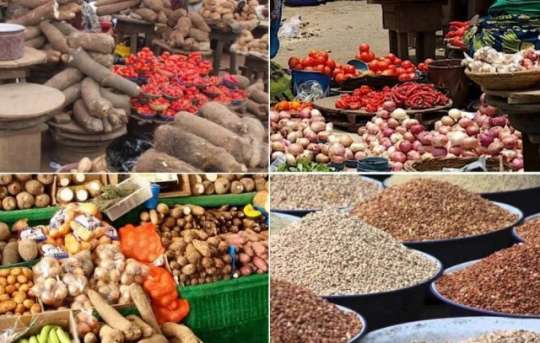Rising energy prices, rising food costs and supply bottlenecks have pushed countries into a high cost of living crisis around the world.
Global inflation hits a 25-year high
As global inflation hits a 25-year high, many people around the world from both rich and poor countries are dreading the loss of purchasing power following sharp soaring cost of living.
COVID-19 impacts
COVID-19 has hit global supply chains with a combination of pent-up demand and delays to shipping as factories across the world face lockdowns and worker absences.
This has led to prices rising, particularly for raw materials.
Energy costs
Energy costs have been one of the main drivers of what is become the highest inflation in a generation.
$91 per barrel of crude
In recent days, the price of a barrel of US benchmark crude oil hit a seven-year high $91 a barrel, a massive jump of about 36% since December 1, 2021.
The effects of these negative developments have been most devastating on poorer countries with fragile economies.
Rising living costs
Rising living costs have caused alarm among governments and central banks around the world.
Asia not experiencing the sharp price rises
Asia is the only continent not experiencing the sharp price rises seen elsewhere. Across much of Asia, price rises are subdued.
Inflation is an ever-present problem in Africa
Across Africa, inflation is an ever-present problem and the impact of the pandemic has worsened the situation.
Import dependent
One trend that is common among African countries with high inflation rates is that they are mostly import dependent.
Weak exchange rates
When a country imports more than it exports, it naturally becomes susceptible to various economic challenges, including weak exchange rates and high inflation rate.
Dramatic increases in imports
Dramatic increases in the cost of raw materials and shipping cost which translated into higher prices of imported goods have pushed inflation up in Africa, and these have eroded an already weak purchasing power of Africans who receive very law salaries and wages.
Fragile economies of African countries
The fragile economies of African countries have deteriorated as a result of the impact the pandemic is having on the global economy.
Food accounts for 40% of sub-Saharan Africa’s CPI
Food accounts for roughly 40% of sub-Saharan Africa’s consumption basket – a measure of goods and services used to measure consumer price index (CPI) inflation.
Imports dependency fuelling weak local currencies
Many African countries spend billions on food imports and the demand for foreign currencies to import weakens the local currencies, resulting in further inflation.
As most African countries import refined petroleum products, the sharp rise in the prices of petroleum has also increased the cost of living for many Africans.
Situation in OECD countries
The cost of living across the 38 countries in the Organisation for Economic Co-Operation and Development (OECD) jumped by 5.8% in the year to November – the highest rate since May 1996. Rising energy prices are the biggest factor.
27.7% rise in cost of energy in 2021
The cost of energy soared by 27.7% in the OECD area in the year to November – the most since June 1980, when interruptions in the world’s oil supply due to wars in the Middle East caused energy prices to spike.
Highest Eurozone inflation
Eurozone inflation is at 5%, the highest since the single currency was launched more than 20 years ago.
The OECD data came as the global risks report from the World Economic Forum (WEF) showed business leaders and economic experts are increasingly worried about ‘livelihood crises’. (www.thisismoney.co.uk)
Rising cost of living in Eurozone
In European countries, the cost of living is rising as inflation in the Eurozone notched a new record high.
5.1% jump in consumer prices
Consumer prices have jumped 5.1% from January last year, up from 5% in December and surpassing the estimates of analysts.
28.6% rise in energy cost in January 2022
Energy is at the forefront of the rise, as prices soar across the continent and many households struggle to cope with the added cost.
Prices rose by 28.6% in January in the 19 Eurozone countries.
Soaring fossil fuel prices
The increases are being fuelled by soaring fossil fuel prices and highlight European countries’ dependence on them.
Cost of living at 30-year high in UK
The cost of living in the United Kingdom (UK) hit a fresh 30-year high in January 2022 as energy, fuel and food prices continued to soar and retailers reined in seasonal discounts.
5.5% surge in prices
Prices surged by 5.5% in the 12 months to January, up from 5.4% in December, increasing the squeeze on household budgets.
Inflation rising faster than wages
Inflation is now rising faster than wages and is expected to climb above 7% this year.
Companies pass on increases to consumers
Since pandemic restrictions were eased last year, companies have faced higher wage, shipping and energy costs which they have passed on to customers.
19% increase in electricity bills, 28% increase in gas bills
The Office for National Statistics (ONS) said electricity bills were up 19% in the year to January and gas bills up by 28%.
Cost of household staples rising by 15%-37%
The cost of household staples is also rising, with pasta prices up 15%, cooking oil up 16% and margarine soaring 37% in the year to January, squeezing household budgets.
Inflation at 30-year high
Inflation – which has been at a 30-year high since December – is set to get worse in April when the energy price cap is lifted.
Average household fuel bill up by £693 in UK
It will push up the average household fuel bill up by £693 a year in England, Scotland and Wales, while a planned rise in National Insurance will also hit people’s pockets.
Bank of England has already put up interest rates twice
The Bank of England has already put up interest rates twice since December in a bid to tame inflation and could raise them again to 0.75% soon. (www.bbc.com)
https://www.bbc.com/news/business-60390527
COVID-19 forcing Canadians further into debt: survey
The rising cost of living and added burden of COVID-19 are forcing Canadians further into debt, a new survey suggests.
Quality of life is diminishing further
The 2021 BDO Affordability Index, a survey done annually that examines how affordable life is in Canada, suggests that many Canadians’ quality of life is diminishing further as more debt is accumulated and the pandemic drags on.
43% added to existing debt due to COVID-19
The survey, conducted by Angus Reid Group in partnership with BDO Debt Solutions, found that 43% of Canadians added to their existing debt because of the pandemic, up four per cent compared to last year.
New debt made standard of living worse
The survey reported that 26%of Canadians incurred at least one new type of debt, the most common being credit card debt, and 70% of these Canadians said the new debt has made their standard of living worse.
51% sure of restoring standard of living to pre-pandemic levels
According to the BDO Affordability Index, only 51% of this group said they will be able to restore their standard of living to pre-pandemic levels.
Increase spending prevented savings
Of the 42% of Canadians who were saving less or not at all during the pandemic, 57% said it was due to an increase in spending on groceries and housing, while 51% said it was due to reduced income or job loss.
23% find it challenging to put food on the table
BDO says 23% of Canadians find it challenging to put food on the table for themselves and their families, up four per cent compared to last year.
The survey reports that 31% of those surveyed indicated that paying for utilities is a challenge and 35% said the same about transportation and clothing costs. (www.ctvnews.ca)
7.5% inflation is the fastest rate in almost 40 years
Prices in the US are rising at their fastest rate in almost 40 years, as inflation rate rose to 7.5% in January, its highest level since 1982.
Inflation rate hovered above 6% in 3 months
December’s increase marked the third month in a row that the US annual inflation rate has hovered above 6% – well above the 2% target of policymakers.
Food, electricity, and shelter are responsible
Food, electricity, and shelter are the biggest factors driving up the cost of living.
Housing (4.1%), groceries (6.5%) increases
Housing costs were up 4.1% year-on-year, while the cost of groceries rose 6.5% – compared to a 1.5% annual average over the last 10 years.
Nearly 30% rise in energy costs in 12 months
Over 12 months energy costs are up by nearly 30% and have returned to their upward trend in recent days
But even if volatile items like food and energy are stripped out, the index still rose by 6%, the highest level for the so-called core rate in 40 years.
Rise is above expectation of economists
Economists had been expecting the rate to rise to a new multi-decade high, but the 7.5% figure was even higher than they were anticipating.
A recent survey by insurance company Allianz Life found that an increasing number of Americans are worried about how much things cost.
Two-thirds of Americans (67%) said they are worried about the rising cost of living in 2021, an 8-point increase from the three in five people who said the same thing in 2020.
The number of Americans who reported worrying about healthcare costs also increased, from 65% to 71%.
Asia is the global inflation exception
Asia is the only continent not experiencing the sharp price rises seen elsewhere. Across much of Asia, price rises are subdued.
1.5% CPI in China
In China, the consumer price index is up by 1.5% compared with a year ago, while in Japan, as usual, inflation is roughly zero.
3% CPI in Australia
In Australia, the headline CPI may be up by 3%, but underlying inflation of 2.1% is towards the bottom of the central bank’s target range.
Inflation above 5% Sri Lanka and Pakistan
Only two big emerging markets in Asia have inflation running above 5% – Sri Lanka and Pakistan – compared with many in Europe and South America.
Seen from Tokyo, Beijing or Jakarta, the global surge in inflation does not look global at all.
This is true even though Asia imports a lot of energy and has suffered the same jump in prices for oil, gas, coal and other commodities as everywhere else in the world.
The reason Asia’s inflation is mild and not severe comes down to one simple factor: it handled the COVID-19 pandemic better than the rest of the world.
Across most of the region, countries managed to avoid compulsory lockdowns altogether (South Korea); limit them in scope and duration (China and Taiwan); or delay such measures until deep into 2021 when vaccines were becoming available (New Zealand).
The consequences of this relative success are now playing out in several ways.
On the demand side of the economy, Asia experienced fewer of the dramatic swings in consumption from services to goods and back again that marked the experience of the US and Europe, as they went into lockdown and came back out again.
If you were never locked up at home, you never felt the need to buy a treadmill, a new television and enough lumber to deck the back yard.
If you could keep up regular haircuts, dental checks and drinks with friends, meanwhile, you had no need to rush out to the hairdresser, the dentist and the nearest bar when the economy reopened.
Japanese firms have so far largely absorbed the rising costs.
They are afraid that passing the increase along to consumers via higher prices will sap household spending.
Japan reported in September that consumer prices rose by 0.1%, the first uptick in 18 months.
China is the world’s largest exporter of goods and a critical link in global supply chains. (www.ft.com)
https://www.ft.com/content/64864c6e-476b-44d1-92f2-69981272a55e
- Church of Jesus Christ, Ga Mantse Foundation renovate Adabraka School - 27 June 2024
- Manufacturers, Trade Minister tussle over proposed cement price regulation - 26 June 2024
- Work begins on Nima-Paloma drains - 26 June 2024




